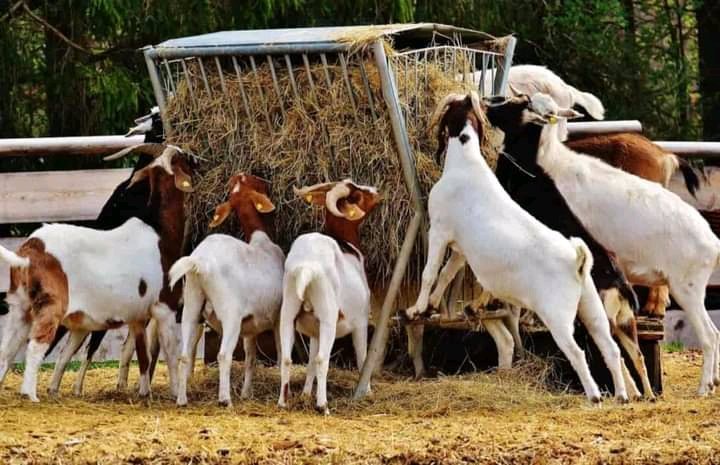Goat farming:8 essential tips for successful farm management

Goat farming is one of the most rewarding agribusiness ventures today offering multiple opportunities for income through meat, milk and manure production. However, running a successful goat farm requires more than just owning a herd. It involves proper management, planning and consistent care. Whether you’re a beginner or an experienced farmer looking to scale up, here are eight essential aspects of goat farming you must master to ensure productivity, sustainability and profitability.
Health Management: Keep your goats healthy and disease-free
Healthy goats are the backbone of a profitable farm. To maintain a strong herd, familiarize yourself with common goat diseases such as foot rot, pneumonia and internal parasites. Early detection and prevention are crucial. Regular vaccinations against diseases like clostridial infections and PPR (Peste des Petits Ruminants) help minimize losses and maintain herd health.
Additionally, establish a deworming and dipping schedule to control parasites and ticks. Quarantine new goats for a few days before introducing them to your main herd to prevent disease spread. Always consult a qualified veterinarian for treatment plans and routine checkups. A healthy herd not only ensures better productivity but also reduces medical expenses in the long run.
Breeding and Reproduction: Plan for onsistent Production
Successful goat farming depends heavily on understanding breeding cycles and proper reproduction management. Female goats (does) typically come into heat every 18–21 days, lasting about 24–48 hours. During this time, mating should be carefully timed to ensure high conception rates.
After a gestation period of about 150 days, ensure your does are well-fed and have a comfortable environment for kidding (giving birth). Newborn kids should receive colostrum (the first milk) within the first hour of birth to boost their immunity. Proper breeding records help track performance and prevent inbreeding, leading to a healthier and more productive herd.
Record-Keeping: Your key to effective farm management
Good record-keeping is the secret weapon of every successful farmer. Keeping accurate records helps you monitor the farm’s performance, track expenses and identify profitable areas. Important records to maintain include:
Health records: Vaccination dates, deworming, and treatments.
Breeding records: Kidding dates, parentage and fertility rates.
Financial records: Feed costs, sales, veterinary expenses and profits.
Using a notebook, spreadsheetor farm management app can make tracking easier and help you make informed decisions that boost efficiency and income.
Market Knowledge: Understand demand and pricing
Before investing heavily in goat farming, research your local market. Identify what goat products are in demand ,whether it’s meat, milk, hides or breeding stock. Visit nearby markets, talk to traders, and analyze current pricing trends to estimate profitability.
You can also explore niche markets such as organic goat milk, value-added products like cheese or yogurt or goat manure sales for gardening. Having good market knowledge helps you make strategic production and pricing decisions that keep you ahead of competitors.
Pasture Management: Optimize your land for grazing
Goats are natural grazers, but poor pasture management can lead to overgrazing, erosion and reduced feed quality. Divide your grazing land into paddocks for rotational grazing, allowing one area to rest and regrow while another is in use.
Plant high-quality forage crops such as napier grass, lucerne or desmodium to supplement their diet. Removing toxic weeds and maintaining soil fertility ensures your goats have access to nutritious feed year-round. Proper land management promotes sustainable farming and reduces feed costs significantly.
Legal Requirements: Comply with farming regulations
Running a legal and compliant farm protects you from unnecessary fines or shutdowns. Familiarize yourself with local farming laws, including registration, animal movement permits, and waste disposal regulations. If you plan to process and sell goat milk or meat, ensure you meet public health and safety standards.
It’s also advisable to insure your animals against risks such as theft or disease outbreaks. Legal compliance builds credibility, especially if you plan to supply large markets or institutions.
Feed Storage: Keep your feed fresh and contamination-Free
Proper feed storage is crucial to maintaining your goats’ nutrition and health. Always store hay, grains, and supplements in a cool, dry and well-ventilated area to prevent mold growth and contamination.
Use rodent-proof containers and stack feeds on wooden pallets to avoid contact with the floor. Regularly inspect stored feed for signs of spoilage or pests. Good storage practices not only reduce waste but also ensure your goats receive consistent, high-quality nutrition throughout the year.
Water Supply: Maintain a clean and reliable source
Water plays a vital role in digestion, milk production and overall animal health. Ensure your goats have access to clean water at all times. For large herds, consider installing automatic watering systems or troughs to maintain a steady supply.
Regularly clean water containers to prevent algae growth and contamination. During hot seasons, increase water availability, as goats tend to drink more to stay hydrated and healthy.
Mastering goat farming requires dedication, learning, and continuous improvement. By focusing on health, breeding, record-keeping, market research, and farm management, you can build a thriving and profitable goat enterprise. Remember success in goat farming doesn’t come overnight; it’s a result of consistent care, smart planning and understanding your animals’ needs.








